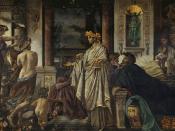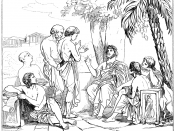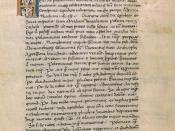Sonia Alexander
Texts & Ideas: This World and the Next
Essay Prompt #6
9/18/2014
Plato's Condemnation of The Wolf of Wall Street
In the Republic, Plato outlines and justifies his reasons for banishing poetry in his envisioned just city. Plato fears that the desires and hankerings of society are easily manipulated and influenced by poetry, and this fear is validated by the recent Hollywood blockbuster The Wolf of Wall Street. This film appeals to the desiring part of the soul which Plato deems must be controlled in all citizens for the just city to be plausible.
Plato reckons that envisaging denotes the lowest form of thinking and its objects fabricate the lowest degree of truth. Plato upholds that paintings, sculptures, and other forms of art are examples of shadows of real objects and can only be known through perception. Socrates explains that the "Painter, couch maker, God-these preside over three forms of couches" (597b).
The three kinds of couches include the one that is in nature, the one that the carpenter produced, and the one that the painter produced. God constructs the couch in its purest form, followed by the carpenter who attempts to physically recreate God's object. The painter, separated from the original object by 2 degrees, can only paint a replication of the carpenter's imitation to the best of his ability. He will never be able to perfectly replicate the original object created by God because he can only imitate an imitation of the real object. Plato maintains that "imitation is surely far from the truth" (598c) and makes the analogy between the painter and the poet. The poet, in this sense, is the painter, and the couch is human experience. The poet, like the painter, can only project "works [that] are third from what is" (599a).


